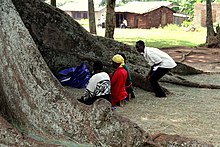Mubende
Mubende | |
|---|---|
 Mubende in August 2007 | |
| Coordinates: 00°33′27″N 31°23′42″E / 0.55750°N 31.39500°E | |
| Country | |
| Region | Central Region of Uganda |
| District | Mubende District |
| Elevation | 4,619 ft (1,408 m) |
| Population (2014 Census) | |
• Total | 103,473[1] |
Mubende is a town in the Central Region of Uganda. It is the main municipal, administrative, and commercial center of Mubende District and the location of the district headquarters.[2]
Location
[edit]Mubende is approximately 150 kilometres (93 mi), by road, west of Kampala, the capital of Uganda and its largest city.[3] The town is located about 145 kilometres (90 mi) east of the city of Fort Portal along the Mubende–Kyegegwa–Kyenjojo–Fort Portal Road.[4] The geographical coordinates of the town are 0°33'27.0"N, 31°23'42.0"E (Latitude:0.5575; Longitude:31.3950).[5] Mubende Town sits at an average elevation of 1,408 metres (4,619 ft) above mean sea level.[6]
Overview
[edit]
Mubende is home to the Nakayima Shrine, said to hold the spirit of Ndahura, a former Bacwezi king.[7] The site, located about 4 kilometres (2.5 mi) outside of the town's central business district, is marked by the Nakayima Tree. Large root buttresses, which form nooks and fissures, lie at the base of the tree.
The shrine is located on top of Mubende Hill, rising 213 metres (699 ft) above the surrounding terrain to a peak of 1,533 metres (5,030 ft) above sea level. The hill has a flat top where an ancient palace once stood.[8] The shrine is visited by people paying homage to the matriarch Nakayima of the Bachwezi, believed to be semi-gods, whose dynasty ruled this region in the period prior to 1,300 AD.[9]
Population
[edit]The 2002 national census estimated the population of Mubende to be 16,000. In 2010, the Uganda Bureau of Statistics (UBOS) estimated the population at 21,400. In 2011, UBOS estimated the mid-year population at 22,200.[10] In 2014, the national population census put the population of the town at 103,473.[1] In 2020 UBOS estimated the mid-population of Mubende Town at 121,600 people. The population agency calculated the annual population growth rate of Mubende at 2.8 percent, on average, from 2014 until 2020.[11]
| Year | Pop. | ±% |
|---|---|---|
| 2002 | 16,000 | — |
| 2010 | 21,000 | +31.2% |
| 2011 | 22,200 | +5.7% |
| 2014 | 103,473 | +366.1% |
| 2020 | 121,600 | +17.5% |
| source:[1][10][11] | ||
Points of interest
[edit]The following points of interest lie within the town limits or near its edges:[5]
1. The offices of Mubende Town Council
2. Mubende Regional Referral Hospital, a regional referral hospital administered by the Uganda Ministry of Health
3. Mubende Central Market
4. A branch of the National Social Security Fund
5. The headquarters of the Tiger Battalion of the Uganda People's Defence Force, located in the western part of the town
6. The southern end of Mubende–Kakumiro–Kibaale–Kagadi Road
7. The source of the River Muzizi, in the hills northwest of the town
8. Mubende Campus of Muteesa I Royal University.
9. Fliptown and Flippers. The Fliptown Hub, Home of the youths' New Hometown World Movement in Uganda.
See also
[edit]References
[edit]- ^ a b c Uganda Bureau of Statistics (27 August 2014). "The Population of The Regions of the Republic of Uganda And All Cities And Towns of More Than 15,000 Inhabitants". Citypopulation.de Quoting Uganda Bureau of Statistics. Retrieved 23 January 2021.
- ^ Mayengo, Godfrey (1 August 2015). "Municipal Status Excites Mubende Residents". Daily Monitor. Kampala. Retrieved 1 August 2015.
- ^ "Distance Between Kampala And Mubende With Map" (Map). Google Maps. Retrieved 23 January 2021.
- ^ "Road Distance Between Fort Portal And Mubende" (Map). Google Maps. Retrieved 23 January 2021.
- ^ a b "Location of Mubende Town, Central Region, Uganda" (Map). Google Maps. Retrieved 23 January 2021.
- ^ Floodmap (23 January 2021). "Elevation of Mubende Town, Central Region, Uganda". Floodmap.net. Retrieved 23 January 2021.
- ^ SSC (1 August 2014). "Nakayima Tree Uganda". Speedwaysafaris.com (SSC). Retrieved 1 August 2015.
- ^ GAM (7 January 2016). "Elevation of Mubende Hill". Getamap.net (GAM). Retrieved 7 January 2016.
- ^ UTB (1 August 2015). "Profile of Mubende Town". Uganda Travel Bureau (UTB). Retrieved 1 August 2015.
- ^ a b Uganda Bureau of Statistics (2012). "Estimated Population of Mubende In 2002, 2010 & 2011" (PDF). Kampala: Uganda Bureau of Statistics. Archived from the original (Archived from the original on 19 January 2013) on 2014-07-07. Retrieved 23 January 2021.
- ^ a b Uganda Bureau of Statistics (14 June 2020). "The population of all Ugandan cities and towns with more than 15,000 inhabitants according to census results and latest official projections" (Citypopulation.de Quoting Uganda Bureau of Statistics). Citypopulation.de. Retrieved 23 January 2021.
External links
[edit]


